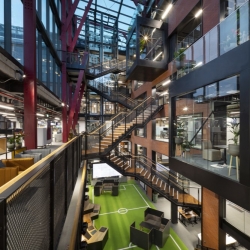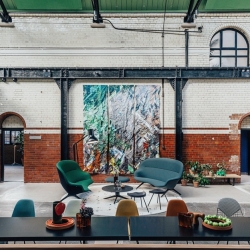To provide the best experiences, we use technologies like cookies to store and/or access device information. Consenting to these technologies will allow us to process data such as browsing behaviour or unique IDs on this site. Not consenting or withdrawing consent, may adversely affect certain features and functions.
The technical storage or access is strictly necessary for the legitimate purpose of enabling the use of a specific service explicitly requested by the subscriber or user, or for the sole purpose of carrying out the transmission of a communication over an electronic communications network.
The technical storage or access is necessary for the legitimate purpose of storing preferences that are not requested by the subscriber or user.
The technical storage or access that is used exclusively for statistical purposes.
The technical storage or access that is used exclusively for anonymous statistical purposes. Without a subpoena, voluntary compliance on the part of your Internet Service Provider, or additional records from a third party, information stored or retrieved for this purpose alone cannot usually be used to identify you.
The technical storage or access is required to create user profiles to send advertising, or to track the user on a website or across several websites for similar marketing purposes.
 British workers are finding their offices and places of work to be severely lacking in inspiration and innovation, according to a new poll from office design and fit-out firm Claremont. The survey of more than 1,000 office workers across a range of sectors set out to identify the impact of an office on a workforce’s behaviour and how staff need to feel in order to be happy, healthy and productive. (more…)
British workers are finding their offices and places of work to be severely lacking in inspiration and innovation, according to a new poll from office design and fit-out firm Claremont. The survey of more than 1,000 office workers across a range of sectors set out to identify the impact of an office on a workforce’s behaviour and how staff need to feel in order to be happy, healthy and productive. (more…)






 The digital edition of issue 14 of IN Magazine is now available to read free,
The digital edition of issue 14 of IN Magazine is now available to read free, 










 The Sustainable Design Collective, a ‘think tank’ group of leading workplace designers and specifiers, has announced a new Forum Day, together with industry awards, focussed on greater sustainability. Originally formed in January 2022, the Sustainable Design Collective hosts regular meetings to collaborate and discuss new opportunities to promote environmental and social responsibility within the office workplace. The group is now inviting conversations with fellow designers as well as suppliers and manufacturers.
The Sustainable Design Collective, a ‘think tank’ group of leading workplace designers and specifiers, has announced a new Forum Day, together with industry awards, focussed on greater sustainability. Originally formed in January 2022, the Sustainable Design Collective hosts regular meetings to collaborate and discuss new opportunities to promote environmental and social responsibility within the office workplace. The group is now inviting conversations with fellow designers as well as suppliers and manufacturers. 











April 19, 2023
We shouldn’t be deterred by the wonky start to the circular economy
by Becky Gordon • Comment, Environment, Workplace design